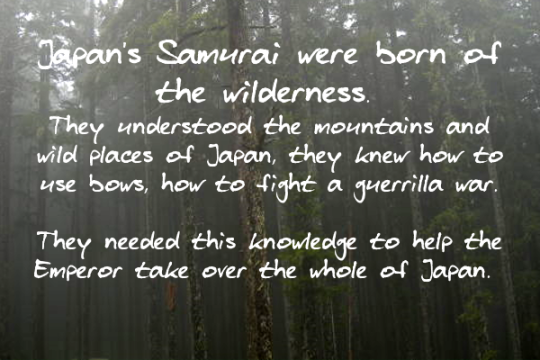The early samurai were largely defined by the wilderness and perhaps most interestingly by the first people's of Japan. For Japan's rugged nearly impassible mountains were covered in primal forests that made in nearly impossible for the Imperial Court to finally take control over the whole of Japan. Their poorly trained army of conscripted peasants continued to loose battle after battle to the Emishi, the armies of hunter gatherers and agricultural people's who wouldn't bend to the Emperor's control. As the peasants died the amount of rice the Emperor could collect from them in taxes decreased. Realizing that he couldn't afford to continue to fight the way he was he tried starving the Emishi out, passing laws against trading with them, but smugglers earned too much money from their fine horses and other goods to stop. Finally in desperation he turned to the hunters within his territory. From the ranks of these people the Imperial Court considered primitive came the Samurai.
These early Samurai understood the mountains and wild places of Japan, they knew how to use bows, how to fight a guerrilla war. They were able to use this knowledge to help the Imperial Court take over the whole of Japan.
In early Japan these Samurai lived in the country, on the farms from which they collected their taxes (A thousand years after their formation the Shogunate would force them to live in cities where he could control them). Here they waged small wars with each other to conquer ever more land or settle innumerable disputes. These early samurai were more likely to fight with bows than swords. Japan is a mountainous uneven land, so rushing an enemy with a sword can be very difficult if not impossible.
Even duels between samurai often took place with both of them firing and dodging arrows.
In this world honor came from victory, indeed many of the early heroes of Japan can be said to have been very similar to later ninjas (and many samurai were ninjas, in fact there were classes which taught samurai how to sneak into buildings and rob them). A samurai might hide in an outhouse or a tree and assassinate their unsuspecting enemy. One of early Japan's greatest heroes, Yamato, finds victory against his enemies first by dressing as a woman and then killing the unprepared man. He then travels to the land of another enemy named Idzumo so he makes friends with him.
So, having secretly made the wood of an oak-tree into a false sword and augustly girded it, he went with the bravo to bathe in the River Hi. Then, His Augustness Yamato-take getting out of the river first, and taking and girding on the sword that the Idzumo bravo bad taken off and laid down, said: " Let us exchange swords! " So afterward the Idzumo bravo, getting out of the river, girded on His Augustness Yamato-take's false sword. Hereupon His Augustness Yamato-take, suggested, saying: "Come on! let us cross swords." Then on drawing his sword, the Idzumo bravo could not draw the false sword. Forthwith His Augustness Yamato-take drew his sword and slew the lclzumo bravo. Then he sang augustly, saying: "Alas that the sword girded on the Idzumo bravo, and wound round with many a creeper, should have had no true blade!" So having thus extirpated the bravoes and made the land orderly.
In addition many samurai could be likened to bandits, vikings, people who raided villages for money. They were often brutal and thuggish. This is clear in fairy tales which treated them as monsters, very much like an oni. They would attack poor travelers. In one tale a samurai demands that two craftsmen hand over everything they've saved over the course of years of work. When they refuse he kills one of them and chases the other for a ways. To a large extent this began to be the way many ordinary people viewed vagrant samurai, as bandits or simple thieves. They broke into people's homes, slaughtered merchants and peasants, and generally caused trouble.
In one story a young man's father is killed and his land taken in war. Deciding that it was beneath him to work and being a fearless warrior "he decided that he would feed himself through highway robbery. So he began to work in the Etschigo Mountains and soon became one fo the most feared predators there was. The mountains were full of other bandits but they knew that Jiraiya was indisputably the most daring and boldest of them all so they came to ask him to be their leader. Jiraiya agreed and soon became a bandit king without peer. After some time however he was not happy with his fate but lived with the hope that he would in time gain enough money to raise an army against his powerful enemy; the daimyo who had murdered his father."












0 comments:
Post a Comment